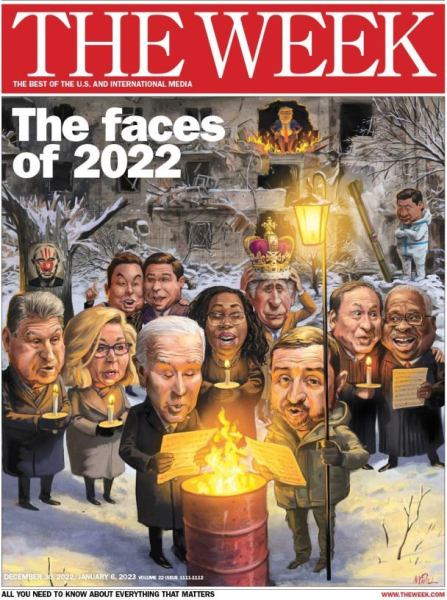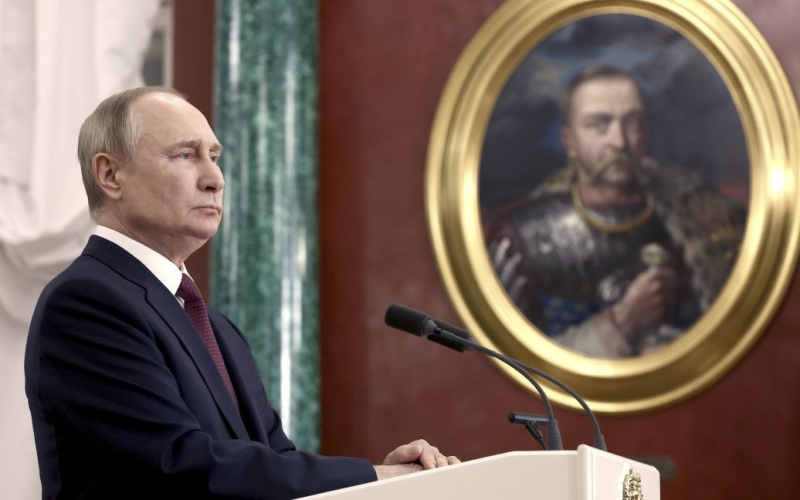The Kremlin is trying to show the Russians fictitious diplomatic victories.
Russian President Vladimir Putin is increasingly in international isolation. The West ignores the Kremlin's hints of readiness for negotiations and increases pressure.
The administration of US President Joe Biden is working to recognize Russia as a “state sponsor of terrorism.” The European Parliament has already voted for a resolution declaring Russia a state sponsor of terrorism. Similar decisions were taken by NATO, the Netherlands and Poland. In addition, US congressmen came up with an initiative to expel Russia from the UN Security Council.
The weekly magazine The Week placed Russian President Vladimir Putin on its cover among the faces of the outgoing 2022. The American and British versions of the publication portrayed Putin as an outcast. In the first version, a blood-stained portrait of the Russian dictator hangs from a tree while Western leaders celebrate Christmas with Ukrainian President Volodymyr Zelensky.
In the British version, Putin in military uniform tries to destroy a snowman wearing a blue and yellow hat and scarf.< /p>


More and more countries are turning away from Russia, against this background, the Kremlin is increasing contacts with the CIS states and authoritarian regimes such as Iran and North Korea.
TSN.ua has collected expert opinions on the prospects for the international isolation of the Kremlin.
Putin was humiliated at two summits
Russian President Vladimir Putin was publicly humiliated at two summits, after which the Kremlin leader made a package of “suicidal” decisions, said publicist and sociologist Andrei Piontkovsky.
Piontkovsky recalled that there were two summits in September-October – the Shanghai Cooperation Organization in Samarkand and the Conference on Interaction and Confidence Building Measures in Asia in Astana.
“In Samarkand, at the SCO summit, he was publicly “flogged” by Xi and Modi. They lectured before the eyes of the whole world that people do not behave like this in the 21st century, especially nuclear blackmail is unacceptable. Nuclear blackmail caused a sharp reaction not only from the United States, but also from China , and India. And then he went to Astana. There were smaller colleagues there, the so-called CIS summit, but there he was even subjected to great humiliations. It would seem that the faithful vassals Rakhmon and Berdimuhammedov said – Vladimir Vladimirovich, why do you continue to behave with us what about the union republics? We have long been no union republics,” he recalled.
According to Piontkovsky, Putin, returning to Moscow, adopted a package of “suicidal decisions” – mobilization, annexation of the territories of four regions of Ukraine , as well as undermining both Nord Streams.
We also note that world leaders boycotted the Russian delegation at the G20 summit held in Bali on November 15th. Russian President Vladimir Putin did not go to the summit, but sent Foreign Minister Sergei Lavrov. During the G20 summit, Sergey Lavrov was ignored by almost all representatives of other states. He met with only one diplomat, Chinese Foreign Minister Wang Yi.
Lavrov left the G20 summit an hour before the massive shelling of Ukraine.
The Kremlin showed “unprecedented activity”
To compensate for the lack of real international victories, Russia developed activity in the post-Soviet space< /strong>, notes Russian human rights activist and blogger Mark Feigin.
He commented on the informal summit of the CIS heads in St. Petersburg on December 26, where the participants summed up the results of cooperation in 2022, and Putin announced the disagreements between the CIS members.
“In addition to Lukashenka, the main figures from Central Asia, Azerbaijan, Armenia is represented. Putin is showing unprecedented activity. Over the past month and a half, they have been gathering in a broader or narrower format – the CSTO, the SCO in Samarkand, the EurAsEC,” Feigin said in a conversation with Aleksey Arestovich, adviser to the Office of the President of Ukraine.
< p>According to him, “frantic activity in the direction of the former USSR“.
“Despite the fact that Putin always draws everyone somewhere – either he called Kazakhstan and Uzbekistan into the gas union, or he is actively making efforts in the Armenia-Azerbaijan direction, trying to play on situations that he can control,” the blogger added.
In turn, Aleksey Arestovich noted that Putin has lost international influence and largely isolated Russia.
“He is forced to rely on the resources that are available to him. The CIS partially depends on him, he acts in the field that is available. Secondly, he portrays until the end of the year the absence of a message to the Federal Assembly, the absence of meetings with big business, the absence of speeches, the fifth -tenth, he demonstrates foreign policy activity, trying to show, first of all, “dear Russians” that they are not isolated or not completely isolated, and he shakes hands, resolves some issues and so on“, Arestovich explained.
The OPU adviser recalled that December 30 is the day of the 100th anniversary of the USSR.
“Here it is impossible not to show that, even in such an ambiguous form, the USSR is alive. Activity is on, this is the former Soviet Union, everyone is shaking hands, everyone is meeting, talking, and Moscow is still the leader of this. A person is trying to manage the resource that is,” he said.
Russia's three main allies in the war
Adviser to the Head of the Office of the President of Ukraine Mikhail Podolyak called Iran, Belarus and North Korea allies of Russia in the war against Ukraine.
“Iran (drones/missiles), North Korea (munitions/weapons), Belarus (infrastructure/territory/equipment). In fact and legally, Russia's allies in the format of an occupation war, massacres of civilians and deliberate destruction of Ukrainian cities have been confirmed. There will be solidary responsibility,” he said.
As you know, in the fall, Russia began to actively launch Iranian Shahed-136 drones in Ukraine. The invaders repainted them and renamed them “Geran”. The main target of kamikaze drones was the energy infrastructure of Ukraine. Initially, Iran categorically denied having handed over its drones to Russia. Subsequently, the Iranian Foreign Ministry admitted that these were their drones, but stated that several drones were allegedly sold to Russia before February 24.
According to Ukrainian intelligence, Russia is negotiating with Iran to purchase ballistic missiles to replenish its stocks.
In turn, North Korea, according to US intelligence, secretly supplies ammunition to Russia, which can then be used in war against Ukraine.
“In September, the DPRK publicly objected that it intended to supply ammunition to Russia. However, our information indicates that the DPRK is secretly supplying a significant amount of artillery to Russia's war in Ukraine shells, while hiding the real destination of the arms shipments, trying to do so, the countries of the Middle East or North Africa,” White House spokesman John Kirby said.
The DPRK leadership predictably denies all accusations .
Military expert Oleg Zhdanov believes that Iran and North Korea do not have enough weapons and equipment to support Russia. p>
See also:

